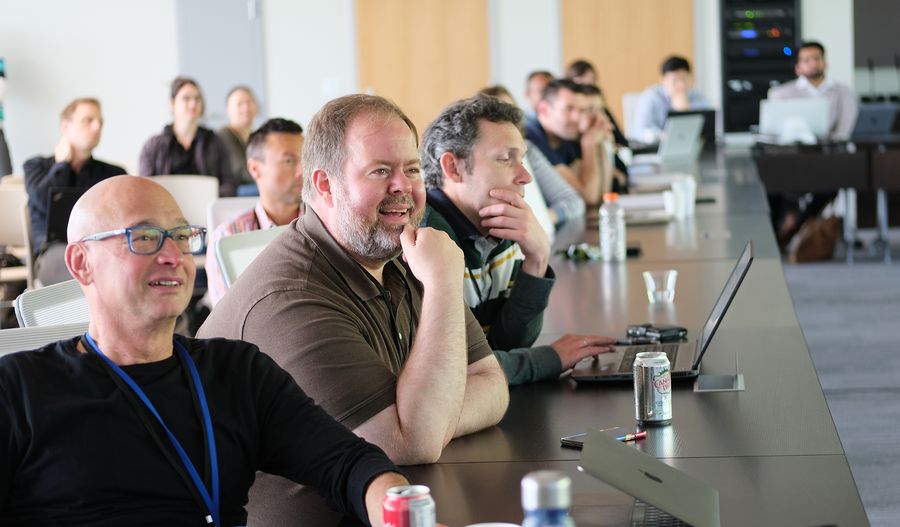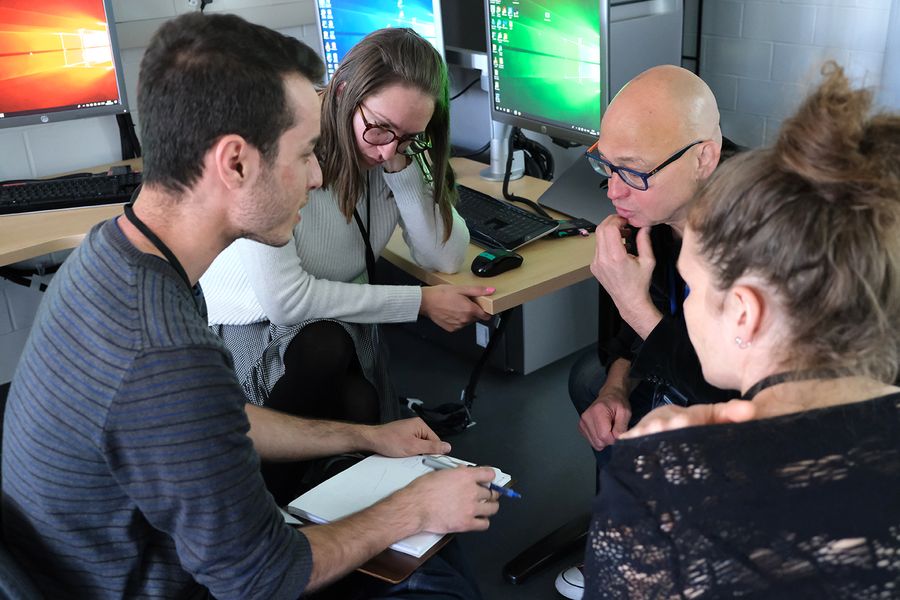Inaugural touchscreen symposium brings neuroscience researchers to Western

Two brains are better than one, but more than 100 is even better. From June 5-6, over 100 neuroscience researchers from around the world visited Western University to take part in the first international touchscreen symposium, New frontiers in cognitive testing using touchscreen technology.
For the two-day symposium on cognitive behavioural testing to evaluate neurochemical circuits, experts from renowned research institutes shared knowledge and research findings on topics including Alzheimer’s disease, Autism Spectrum Disorder, Huntington disease and more. The symposium was organized by Western neuroscientists, Dr. Flavio Beraldo and Dr. Amy Reichelt, and supported by Western’s BrainsCAN and the International Society for Neurochemistry.

Dr. Tim Bussey and trainees discuss ideas for setting up a touchscreen experiment during the touchscreen training course, June 3-4.
Western is home to experts in cognitive testing, making it the ideal location for this first touchscreen symposium. Dr. Lisa Saksida and Dr. Tim Bussey are the inventors of a system available for touchscreen testing and have nearly 30 years’ experience using touchscreen technology to investigate cognitive function. They work closely with Dr. Vania Prado and Dr. Marco Prado, leading experts in cellular and molecular communication research focused on Alzheimer’s, Parkinson’s and Prion diseases.
“Cognitive neuroscience is our strength and our goal is to share and increase knowledge within the touchscreen behavioural research community so we can better understand how alterations in brain chemistry affect high-level cognition,” said Marco Prado, professor in the Schulich School of Medicine and Dentistry, and co-lead for the touchscreen symposium. “The symposium encourages collaboration among researchers that will lead to new discoveries in this field.”
Researchers from Australia, South Korea, China, Brazil, US, Canada, among others, took part in the symposium. Despite the involvement from world-renowned neuroscientists, one of the aims of the symposium was to encourage young investigators to share their innovative research. Beraldo, a Research Associate at Western, conducted a talk on frontotemporal dementia, while a datablitz session gave other young investigators, along with scholars from the International Society for Neurochemistry, the opportunity to present their research.
“Encouraging and providing a platform for young investigators to discuss their research strengthens our community,” said Bussey, professor in the Schulich School of Medicine and Dentistry, and co-lead for the touchscreen symposium. “It builds all of our capacities while generating new and innovative ideas for the future of cognitive neuroscience."
Training the next generation of researchers is also an important aspect of the symposium. Earlier in the week, 15 researchers traveled to Western ahead of the symposium to take part in a touchscreen training course led by Western experts. The hands-on training course gave trainees the chance to try the touchscreen technology by learning how to set up an experiment, analyze data and combine the touchscreens with other neuroscience techniques.
“The training course was a great way to kick-off a week of research and discussion,” said Julie Dumont, BrainsCAN Research Associate, Touchscreen Platforms and lead for the touchscreen training course. “Participants benefited from the opportunity to use technology that might not be available at their institutions while learning new skills to expand their knowledge.
The touchscreen symposium took place June 5-6 in the Western Interdisciplinary Research Building. For more information, visit http://touchscreencognition.org/.
The touchscreen symposium and training session are jointly funded by Western’s BrainsCAN and the International Society for Neurochemistry (ISN).






